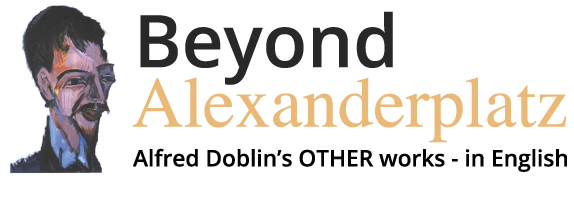Wallenstein revised 2021
I have revised and corrected the first edition of my translation of Wallenstein with the help of the meticulously annotated edition by Erwin Kobel (dtv 2003). I’ve also made numerous stylistic improvements. The first edition posted in January 2019 has now been removed from the website.
You can download the 2nd revised and corrected edition :
TRANSLATING WALLENSTEIN
When I first began to translate Wallenstein in 2017, I made use of the online digital reproduction of the first German edition of 1920. This had the advantage of word search, but the grave disadvantage that the 1920 edition was full of errors, usually arising from the printer’s misreading of Döblin’s rather appalling handwriting.
At the time my late wife and I were trying to establish a viable pattern of life in two countries, she being Chinese, while I’m British. Since it wasn’t practical to carry a suitcase full of reference books back and forth every six months or so, I relied on the Internet to look up references that filled out the historical background to Döblin’s imaginative (and dateless) epic fiction.
Sometimes I spent hours on a wild goose chase, thanks to Döblin’s wrong spelling or a printer’s misreading.
Now, having acquired Erwin Kobel’s copiously annotated edition, I’ve been able to revisit my translation and correct numerous mistranslations; e.g. I had not known that “gefroren” in the 17th century could mean not “frozen” but “unassailable, invulnerable”. Which makes better sense when Emperor Ferdinand is explaining away his lack of decisive action.
I’ve also added several more notes, drawing selectively on Kobel’s work, without overloading the reader. E.g. Kobel has tracked down many of Döblin’s sources, or alternatively decided that Döblin has made up some statement or letter or action, but I’ve only rarely pointed to such cases.
RETURN TO THE COUNTER-REFORMATION
I was struck forcibly, while revising Wallenstein during the extraordinary situation we have been living since spring of 2020, by the parallels between the ideologies of the 17th century and the present day. Take for example this excerpt from a sermon in Chapter 17 of Wallenstein (page 181) –
What do they do with the gospels of Mark Luke Matthew John? They pick away at the very foundations of the Saviour and His works, split hairs, distil, these quacksalvers in the body of our holy Church. The Gospel is tough, raw, leathery, teeth must be especially sharp and pointed; the Church hangs it well for you, makes it tender, stacks it in the smokehouse, sets about it like a good butcher-woman, cuts for you the best most nourishing morsels; we never stop making a nice little soup for you, stewing, roasting, a joy for your belly.
Compare it with this remarkable piece from Forbes magazine in July 2020:
You Must Not ‘Do Your Own Research’ When It Comes To Science
Ethan Siegel Senior Contributor, Forbes Magazine, 30 July 2020
“Research both sides and make up your own mind.” It’s simple, straightforward, common sense advice. And when it comes to issues like vaccinations, climate change, and the novel coronavirus SARS-CoV-2, it can be dangerous, destructive, and even deadly. The techniques that most of us use to navigate most of our decisions in life — gathering information, evaluating it based on what we know, and choosing a course of action — can lead to spectacular failures when it comes to a scientific matter.
The reason is simple: most of us, even those of us who are scientists ourselves, lack the relevant scientific expertise needed to adequately evaluate that research on our own. In our own fields, we are aware of the full suite of data, of how those puzzle pieces fit together, and what the frontiers of our knowledge is. When laypersons espouse opinions on those matters, it’s immediately clear to us where the gaps in their understanding are and where they’ve misled themselves in their reasoning. When they take up the arguments of a contrarian scientist, we recognize what they’re overlooking, misinterpreting, or omitting. Unless we start valuing the actual expertise that legitimate experts have spent a lifetime developing, “doing our own research” could lead to immeasurable, unnecessary suffering.
Priest in the Counter-reformation: “Heretics are dangerous. Don’t look for truth by yourselves. Leave it to the Church to digest the truth and hand it out to you. Otherwise you will burn in Hell.”
Propagandist in 2020: “Heretics Scientific debate is dangerous. Don’t look for truth by yourselves. Leave it to the Church fact-checked approved experts to digest the truth and hand it out to you. Otherwise you will burn in Hell cause immeasurable suffering.”
Before March 2020 it would have been absurd to predict that two hundred years of Enlightenment and arduously acquired undertanding of scientific method and rational debate could so easily be reversed! Yet Döblin, throughout his career, was sceptical of “progress”. In Mountains Oceans Giants he depicted in gory detail how 20th century trends might develop. In the Amazonas trilogy he showed how the Nazis had not emerged from nowhere: five hundred years of European rapacity in the colonised parts of the world paved the way.
In his 1936 essay The Historical Novel and Us, Döblin viewed the creative writer as “a special kind of scientist. He is a special alloy of psychologist, philosopher, social observer” capable of “a more complex seeing and thinking, a deeper empathy, a more nimble combining:”
The concept of resonance helps us understand this. He possesses an uncommonly delicate and well-developed resonator. And when certain congenial historical things crowd in on him enough, the resonator begins to oscillate, and he, the scientist, is a writer or poet if only he can now transform the resonance into language and images.
Many passages and episodes in his Wallenstein resonate with us today, enable us to reflect on our own current situation.


